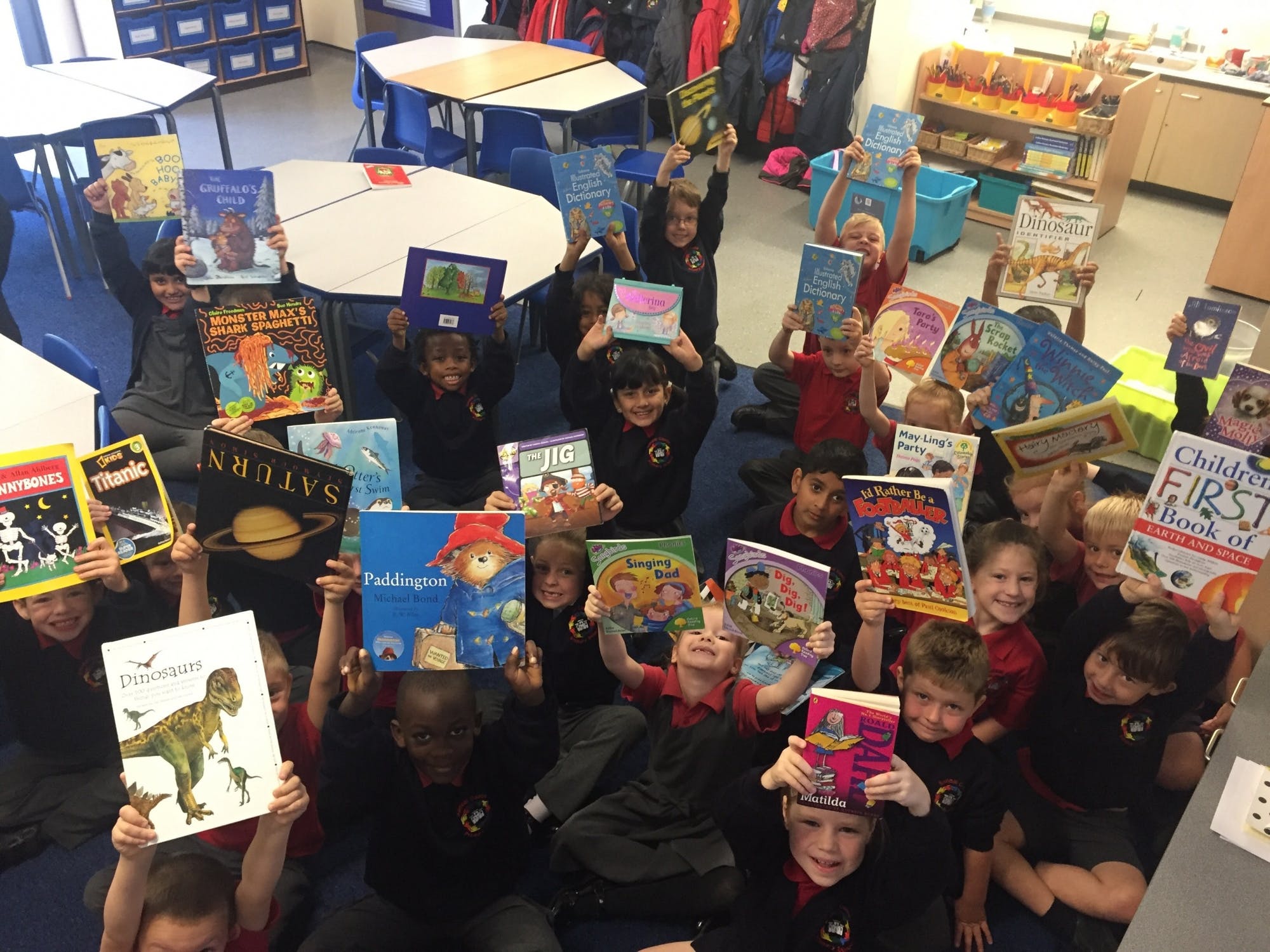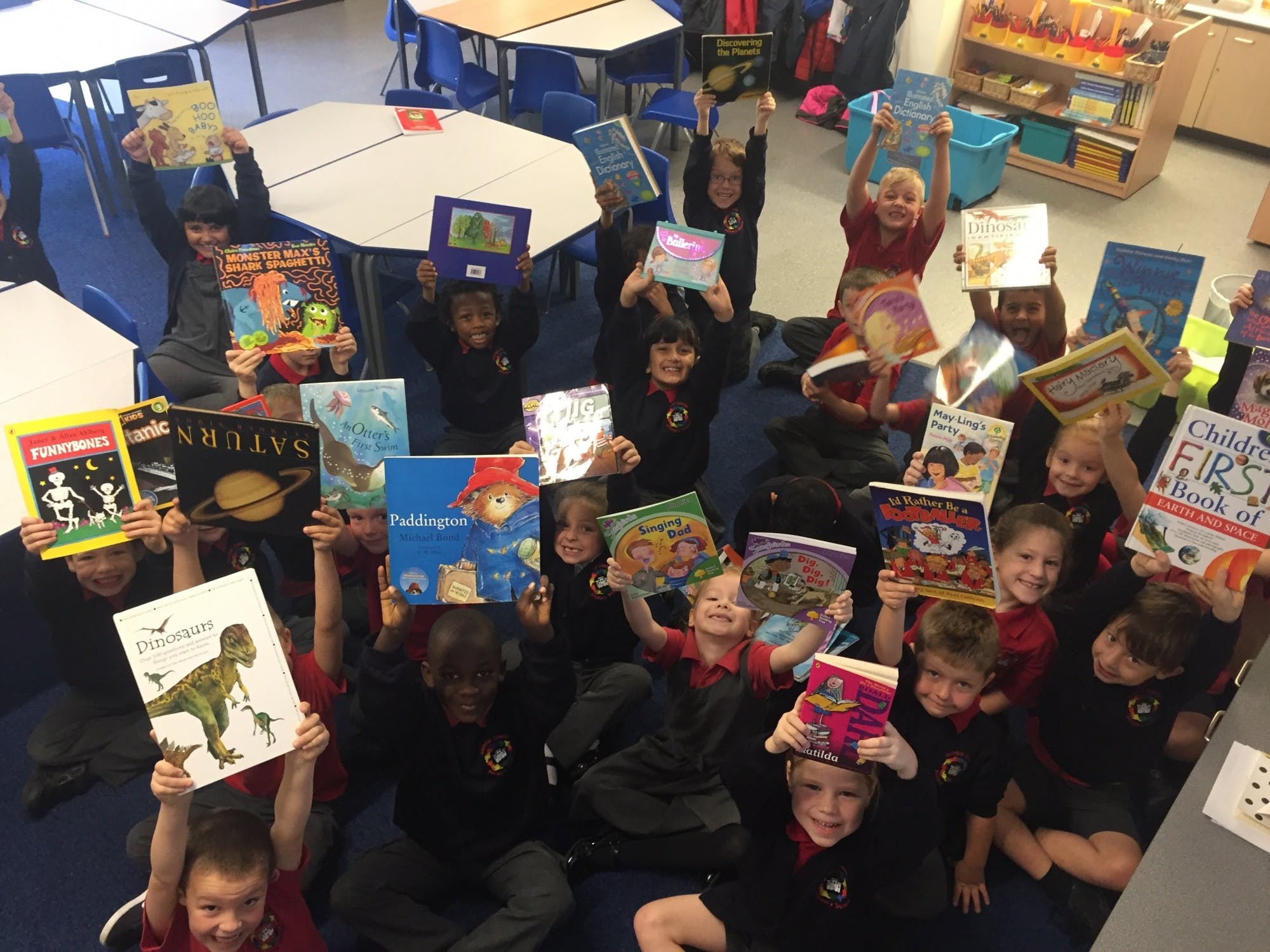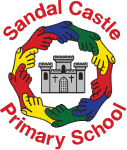Together we Learn. Together we Live.
Together we Grow. Together we Give.
Welcome to our English Page
Here you will find information and resources to support your children with their English work.
Learning to read so we can read to learn and gain pleasure is at the heart of all areas of the curriculum. Early reading is therefore our first, foremost and central priority in school so all children are readers. Books are enjoyed and used across all curriculum areas as highly valued hooks, tools and a way of escaping in to other worlds, times, places and situations.
We are determined that all children will learn to read, regardless of any barriers to and levels of learning. We place a strong focus on reading and believe that all children need to learn how to read by the end of KS1- marrying both strong phonic knowledge and fluency for comprehension. Our teaching of phonics across school is fundamental to the progress of all children, regardless of their starting points. We believe that it is important that all children become fluent readers and as a result, reading is always our first, foremost and central ongoing priority. Because of this, children will have the skills and knowledge to access the wider curriculum. A crucial part of this is to inspire a love of reading. A range of texts and genres are shared and used daily as part of functional reading lessons but also as part of timetabled ‘story time’ across school- this is integral to our approach to whole school reading. We foster a love of reading across the curriculum as it is our upmost priority. Our teachers read to children every day, sometimes to challenge and often purely for pleasure. Reading aloud and storytelling are skills we develop and value highly amongst our body of staff.
SMSC Statement
At Sandal Castle Primary School, the quality, breadth and depth of our curriculum ensures that children are open minded, respectful, resilient, tolerant and have empathy when in school and in the wider community. Our school’s vision and its associated values develop aspiration in all children, giving them resilience to cope well when things are difficult and the perseverance to overcome barriers to their own learning and to make positive choices. As a school, we make sure all children have curriculum opportunities to look beyond themselves, ask ‘big questions’ and think globally about life and develop an understanding of disadvantage, deprivation and the exploitation of the natural and human world. This provides opportunities for all children to engage in social action and to understand how they can challenge injustice both now and in the future. Our children are advocates and leaders for positive change. Their behaviour and attitudes to courageous advocacy and social action are recognised both within school and within the community.
Overview
In English, we teach our children to speak, read and write confidently in order to communicate effectively and with purpose. Through rich reading, speaking and writing opportunities, we develop confident, broad-minded children who can discuss and write about issues affecting the world around them, interpreting language and manipulating it powerfully for effect. Our curriculum provides children with a wide range of texts to inspire imagination and creativity, encouraging a love and pleasure of reading across a range of genres. We study author’s craft so that our children can develop their own writing styles after studying the patterns and rules of language- spelling, grammar and punctuation. We create opportunities for our children to study texts critically and analytically through in depth book talk where children debate, discuss and explore texts enthusiastically in order to develop their own voice and opinions about key issues affecting the human and natural world. We encourage our children to view reading, writing and speaking as powerful tools for change and use Bloom’s Taxonomy to enable our children to deepen and broaden their understanding and skills across the English curriculum.
The aims of our English Curriculum are:
- To ensure that the content of our phonics programme is appropriately structured and sequenced to support pupils’ progress with reading.
- To ensure that our phonics programme matches or exceeds the expectations of the Curriculum.
- To ensure that we have clear expectations of our children’s phonics progress from EYFS to Year 2.
- To ensure ambitious and clear expectations when teaching phonics.
- To develop a body of staff who are early reading experts.
- To develop and foster a love of reading through clearly timetabled story time.
- To create well organised and purposefully accessed reading areas around school.
- To model positive attitudes to reading by talking knowledgeably about books.
- To read aloud to children, confidently using a success criteria to inspire enjoyment and pleasure.
- To demonstrate to our parents how important reading aloud to their children at home is.
- To develop a culture of reading in school where children can access a range of books to share and read at home and school, where they can discuss books with enjoyment and comprehension.
- To ensure that our home school reading system celebrates what children can do by making sure that the sequence of reading books show progression in phonics knowledge that is matched closely to our phonics programme. This enables children to read at home with accuracy because it makes sure that children have learned the relevant phonic skills and exception words in a book before giving it to them to read.
- To develop confident speakers who can articulate their feelings, thoughts and opinions confidently, clearly and with a range of language structures for effect, adapting it for purpose, circumstance and formality.
- To develop good listeners- children who value what others have to say and listen with respect, learning from each other and developing the thoughts of one another to create greater depth.
- To use the range of Bloom‘s Taxonomy thinking skills to broaden understanding of key concepts so that children can evaluate, analyse and respond to language in its various forms critically.
- To develop readers and writers who are secure in their phonic/spelling knowledge and can use and apply it to read and write widely.
- To develop confident, independent readers who love to read across a range of genres and for a range of purposes through a comprehensive approach to teaching the mechanics and comprehension of language, sentence/word knowledge and vocabulary.
- To enable children to write accurately with a secure understanding of spelling, grammar and punctuation rules and patterns.
- To encourage children to read with awareness, using reading as a tool to reflect on their own character and choices but also as a tool to inform them and raise awareness amongst our readers by ensuring our children access challenging and pertinent texts.
- To use reading and writing as vehicles for change in our school, local and wider community by ensuring that children have a voice through a high expectation of the use of the written word so that children recognise the value and purpose of reading and writing.
- To enable children to manipulate language independently and deliberately with meaning and in order to have a greater impact on their reader, creating opportunities to learn from a range of high quality authors and model texts across the curriculum.
- To create opportunities for children to plan, draft and then edit and improve their own work.
- To provide opportunities for children to develop key reading comprehension skills such as inferring meaning in a range of situations, summarising and developing in depth understanding of vocabulary in its various forms and nuances.
Spiritual, Moral, Social and Cultural development will be developed through the teaching of English:
Pupils’ spiritual development is shown by:
- Providing writing opportunities across the curriculum so that children develop their style and purpose in response to a range of ‘big questions’ linked to all curriculum areas, including RE, History, Geography and Science.
- Developing writing opportunities within English which respond to current affairs, link explicitly with our Equality and Diversity curriculum and which offer the opportunity to tackle challenging world issues, past and present.
- Using texts which provide challenging themes and issues to discuss and debate.
- Using key strategies from P4C when responding to texts and ideas which offer stimulus for writing and discussion.
- Providing a cross curricular library to ensure a rich repertoire of texts is used to stimulate deep and meaningful conversations as a key stage in planning writing.
- Ensuring that children’s writing is used to raise awareness in a variety of ways including our school newspaper so that we are clearly demonstrating writing is a powerful tool in leading change in our community and is an effective means of expression and way of developing ideas, thoughts and feelings.
- Facilitating the development of children’s imagination and creativity, allowing freedom of expression through language.
- Encouraging self-reflection and self-improvement through exposure to challenging, meaningful and relevant text sources.
Pupils’ moral development is shown by:
- Creating a wide range of opportunities in English to reflect upon and develop opinions about issues affecting our local, national and global community.
- Encouraging children to develop their own voice through language as a tool for expressing opinions and advocating change amongst others.
Pupils’ social development is shown by:
- Accessing and responding to stimuli for reading and writing through self-reflection, pertinent pair and group work and shared discussion where children learn to value and develop each other’s ideas, supporting and celebrating their peers whilst learning how to analyse critically but appropriately.
- Developing confidence in writing and reading skills by creating opportunities to share their own work in a range of circumstances such as performing poetry in school and church, reading with local residents, writing for the school newspaper- projecting their voice in these various ways confidently and articulately.
Pupils’ cultural development is shown by:
- The use of a range of pertinent cultural links as stimuli for writing, provoking discussion and debate and ultimately creating better, more powerful writing as a result.
- The use of challenging texts which explore different cultures and traditions, allowing children to develop and challenge their own opinions and share them in a safe environment.
- The use of high quality texts, art, music and various other media as stimuli for writing in order to develop writers and speakers who are culturally intelligent.
- The use of stimuli which celebrates equality and diversity culturally so that English as a subject is used as a very powerful tool to develop positive and healthy attitudes towards ethnic diversity, religion and gender for example.
English at Sandal Castle Primary School is taught through a variety of different strands for which you will find information and evidence using the various tabs:
- Writing- sharing ideas, using texts, video clips and current affairs as inspiration and applying understanding of author craft, language choices and grammar rules to our independent work.
- RWI Phonics/Spelling- daily teaching of spelling and phonics where RWI has been adapted to suit the needs of our children.
- Read and Respond- using challenging and inspiring texts to engage children in engaging discussions which delve deeply in to language, structure and various themes expressed in texts.
- Cracking Comprehension- a Rising Stars programme of work which has been developed to suit the needs of our children. This element of the reading curriculum focusses on test technique and responds to the question level analysis of test practice throughout school. There is a focus here on vocabulary and language development.
- Story Time - Story time is an integral part of our school day and is timetabled as
such.
- Reading Buddy System- Children across school support their peers from either the same year group or a different year group with their reading. The relationships formed are meaningful and productive and due to a daily commitment to this system, more children are reading confidently and fluently.
- SPaG- grammar and punctuation rules are also taught discretely in addition to within a writing lesson to enable children to practice a variety of skills and questions. This ensures that our children can apply these rules effectively in independent writing but also respond to specific questions.
- My Book Blog- My Book Blog is an online resource which allows all children from years 2-6 to read blog about the books they are reading for pleasure. It helps them to develop their vocabulary, their comprehension skills and above all enthuses and motivates our staff and children as readers.
- Spellodrome-Spellodrome is a recent addition to our English Curriculum. It is a fantastic online resource which allows all children to practice key spellings (age and stage appropriate) through a variety of games with their friends but also peers from all around the world.
- Perfect Poetry by Chris Quigley- Staff use this resource and adapt it to expose our children to challenging and meaningful poetry across the English Curriculum-sometimes in writing, sometimes in reading.
- Poetry By Heart-in response to the curriculum and pupil voice, this resource is used to form the basis of poetry taught through drama and performance. This is used in class but also as a structured Golden Time resource.
- Vocabulary-similarly to Cracking Comprehension, this resource is adapted according to need throughout school to develop and widen children’s vocabulary through games, drama and activities which then encourages children to make wiser vocabulary choices independently.
- Individual Reading- Teachers read with a child during morning and afternoon registration as well as at other times during the school day. In addition, TAs and volunteers also listen to readers. This ensures that staff are able to support children’s individual reading journey effectively.
- Active English - Our SPaG curriculum is also taught actively through PE with our member of staff from Elite Kids Coaching who works closely alongside staff to design meaningful and purposeful opportunities to develop important grammar, punctuation and spelling skills.
Dictionary Work
We came across a great little video demonstrating how to use a first dictionary.
https://global.oup.com/education/searchresults?search_input=oxford+firdt+dictionary®ion=uk#
We are really enjoying using singing to help learn key grammatical skills and concepts. These videos are really helping us to retain and then apply a variety of skills
Active English
Children have been learning to identify and use different types of determiners. First we categorised some different examples and then we moved around the room to match up examples with our peers and to categorise them using headers around the room.
We use a systematic synthetic phonics programme based upon Read Write Inc- please click on this link for more information.
Our children in Key Stage one are taught to read utilising the Oxford Reading Tree Reading Scheme. Please visit here to learn more.
How parents can support spellings
English National Curriculum - Appendix 1 - Statutory Spelling lists

Once upon a Story - a fantastic resource! Every day an image from a picture book (books chosen are appropriate for both Infant and Junior phases)will be added. If you click on the image, a set of questions appear linked to the image. Why not inspire reading at home through this brilliant web based resource?
Read and Respond
Throughout school from Foundation Stage to Year 6, children take part in a specific reading comprehension lesson every week. This lesson is based upon a text which has been chosen primarily because of the level of challenge it presents, either challenge through language, theme/issues or structure for example. A unit of work is planned around a text and each child takes home a chapter/section of the story every week in preparation for this lesson. This is a crucial part of homework because it allows the time in lesson to be spent exploring a wider range of comprehension skills in depth rather than simply reading the chapter and retrieving basic information as a recap. Skills focussed around Bloom’s Taxonomy such as summarising and predicting using evidence from the text, evaluating and analysing an author’s craft, making judgements about characters’ motivations and debating and examining key issues are just a selection of the vital comprehension experiences our children participate in weekly. The work produced in these lessons is recorded in a Reading Journal which showcases the variety of developing reading thinking skills on offer.
Here are some examples of the texts we use in our Read and Respond sessions
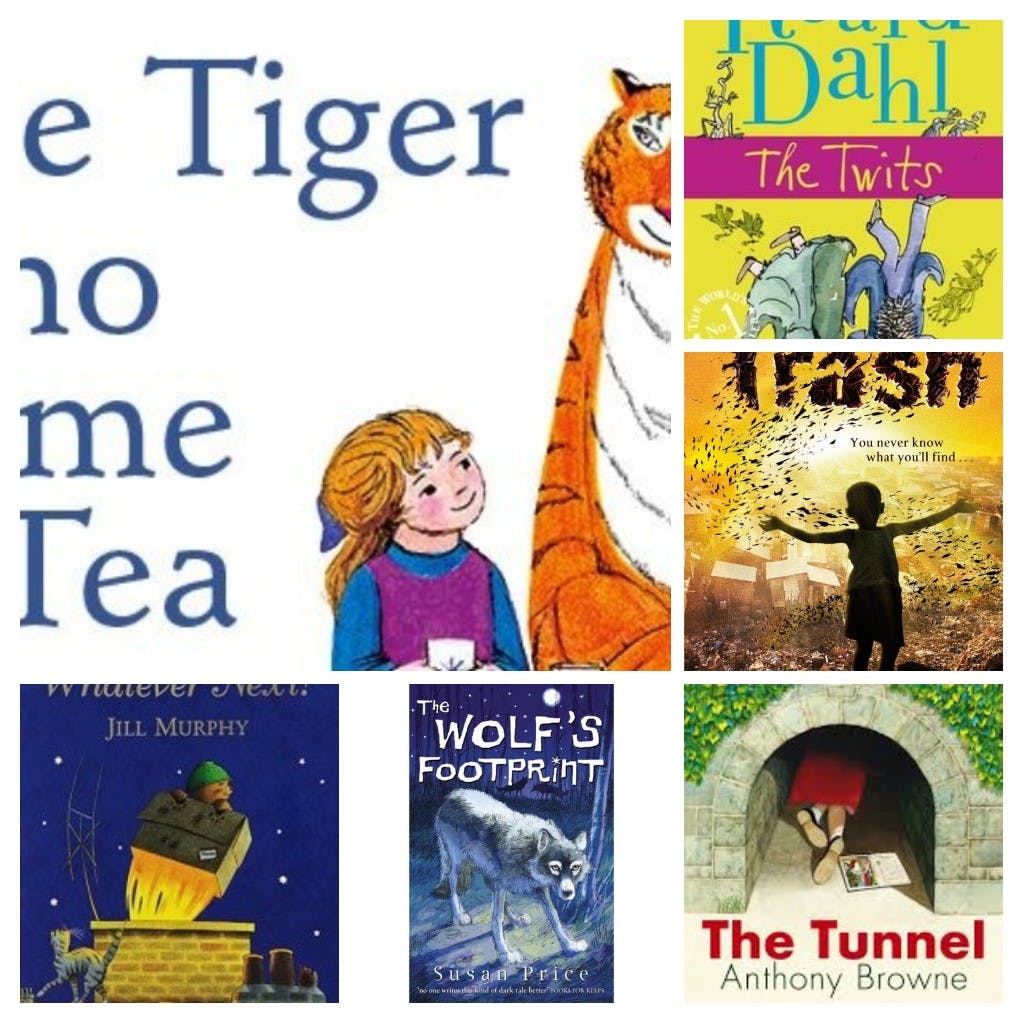
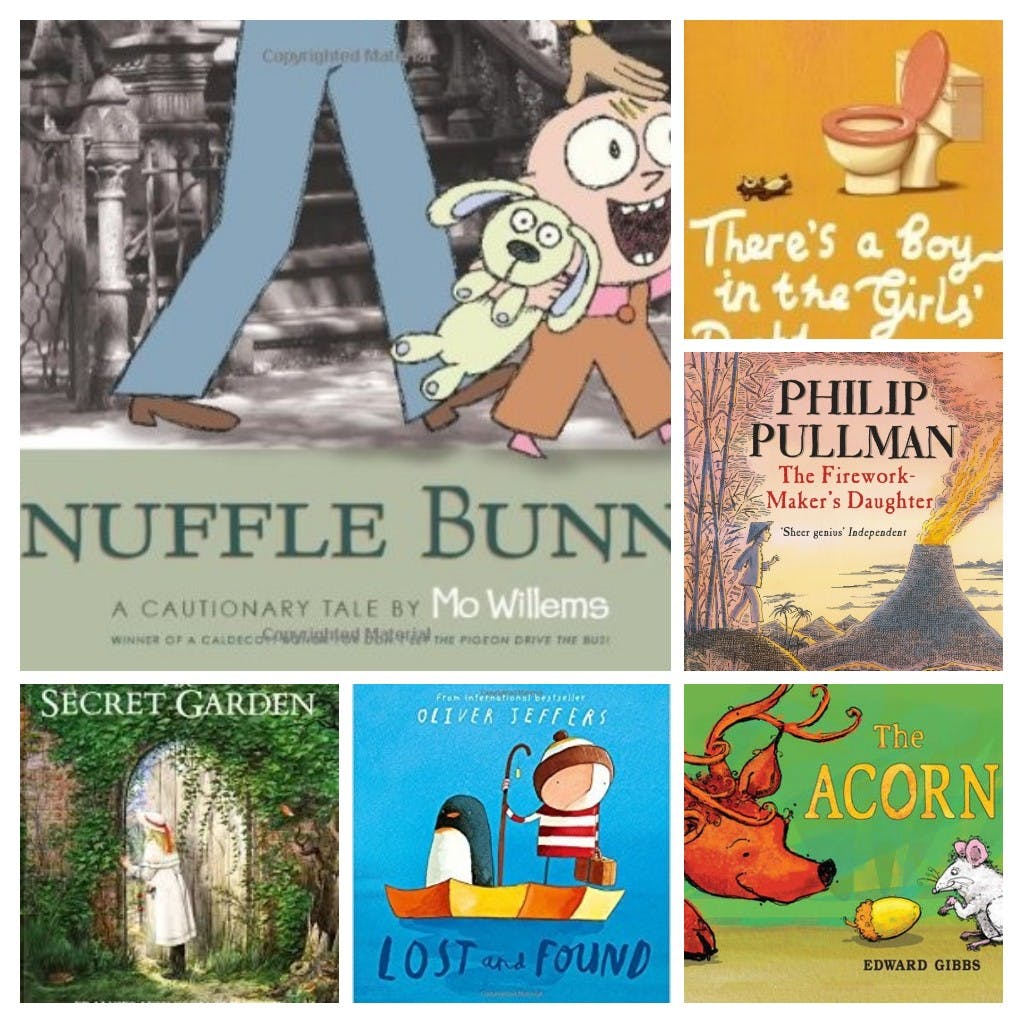
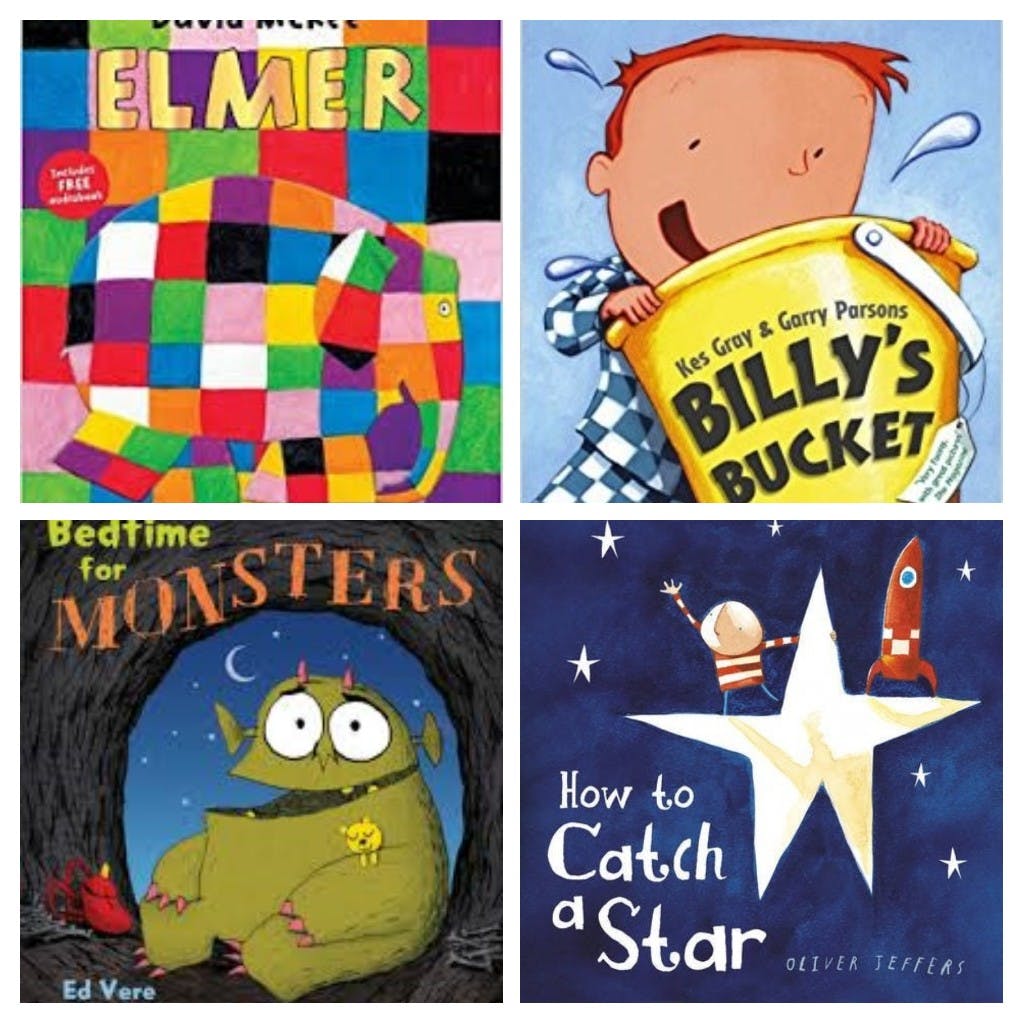
Cracking Comprehension
Alongside the broad depth of comprehension skills explored and developed as part of the Read and Respond lessons, our children take part in a daily session of very honed in and specific test related comprehension skills using Rising Stars Cracking Comprehension to ensure that our children develop the skills to apply their reading understanding in very focussed and test based scenarios. There is a specific programme of work for each year group to follow including test based practice and experience where skills are modelled, revised and assessed.
Have a look at these useful resources to support your child with their reading
Foundation Stage and Key Stage 1 - Reading questions for parents
Roald Dahl Day
To celebrate Roald Dahl Day we read lots of Roald Dahl poems and short stories in class and had two great assemblies discussing our favourite Roald Dahl books and characters. Our children were also encouraged to bring in a favourite book/comic to read during the day.
